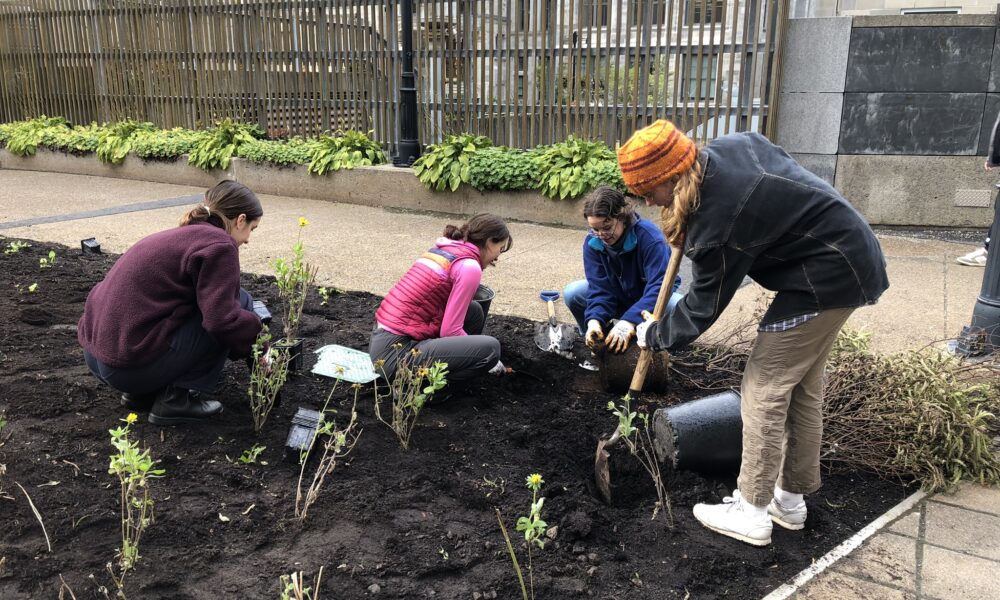McGill community members, numbering around 10 total, gathered to plant a garden on the terrace of the Otto Maass Building on Oct. 15 as a part of the university’s Biodiversity Plan 2030. McGill adopted the plan in 2023, which commits the university to increasing biodiversity on its campuses by cultivating and supporting native plant and animal species on the land the university occupies.
The event saw the sowing of about 365 plants, covering an area of 250 square metres on the terrasse of the Otto Maass Building. 95 per cent of the new garden is composed of indigenous species, which will take a few years to reach their mature size.
The biodiversity plan is a part of McGill’s Climate and Sustainability Strategy 2020-2025, which sets the direction for the university’s long-term approach to combating climate change, including its commitment to achieve carbon neutrality by 2040.
Marie-Claude Carignan, Climate and Biodiversity Officer at the McGill Office of Sustainability, organized the community planting event and emphasized its alignment with McGill’s biodiversity plan.
“We’re focusing, in this case with our garden, on indigenous species, and more broadly we’re trying to see how biodiversity, […] conservation, and restoration can be better ingrained within operations at McGill,” Carignan said in an interview with The Tribune.
Ahead of the United Nations Biodiversity Conference (COP15) hosted in Montreal in December 2022, McGill joined hundreds of universities globally in signing the Nature Positive Pledge, which encourages higher education institutions to restore ecosystems damaged by their presence. This resulted in the development of McGill’s Biodiversity Plan 2030, which is the first plan of its kind implemented at McGill.
The university’s biodiversity plan consists of six key objectives; to maintain inventories of biodiversity at McGill, analyze the university’s impact on biodiversity, increase engagement with biodiversity-focused activities, embed biodiversity in university operations, increase green spaces on campus, and develop partnerships to meet biodiversity targets.
The community planting event was in line with the plan’s goal of increasing McGillians’ engagement with biodiversity-focused activities and increasing the quality and quantity of green spaces on campus. Organizers provided volunteers with gardening gloves, shovels, and hot chocolate.
Carignan noted that student enthusiasm for the event encouraged the Office of Sustainability to involve the McGill community in future initiatives as much as possible.
“We’ve had a lot of people requesting [to help out] when we’re doing […] events,” said Carignan. “They actually want to get their hands dirty and actually want to participate and actively be involved in the biodiversity project on campus.”
Sofija Kuzmanovic, U0 Engineering, attended the event, and reflected on the value of direct engagement in community projects.
“People are looking to make small local efforts to combat issues with pollution and overbuilding,” Kuzmanovic said. “I know McGill is trying to meet certain goals with its biodiversity, and being able to contribute to that and see it in action makes you realize that there really is an impact in something you can do.”
Organizers will label the plants, and install a chronolog photo station, allowing community members to monitor the garden’s development through a publicly-accessible timelapse.
While McGill has long-term sustainability goals, some say the university is not going far enough. Lola Milder, U3 Arts, an organizer with Divest McGill, a climate advocacy group, wrote to The Tribune that she believes the university needs to adopt a more in-depth approach to combating the climate crisis.
“I think that McGill operates on a narrow understanding of ‘sustainability’ that focuses on individualized actions like recycling and biking to work that allow business at McGill to continue as usual,” Milder wrote.
According to Milder, McGill’s size and influence as an institution heightens its obligation to respond to the ongoing climate emergency.
“It’s exciting that they’re moving forward to divest the university’s direct holdings from fossil fuel corporations,” Milder wrote. “But the endowment is still funding climate destruction through its indirect holdings in fossil fuel corporations, and holdings in many other destructive industries, including weapons manufacturing.”
A previous version of this article stated that McGill’s biodiversity plan was adopted in 2022. In fact it was adopted in 2023. The Tribune regrets this error.









